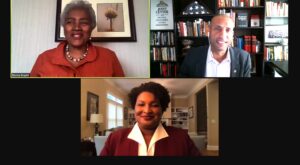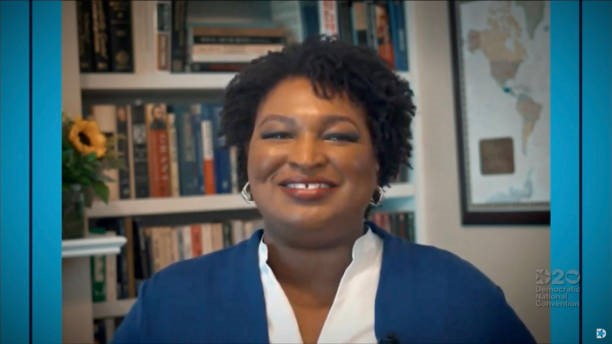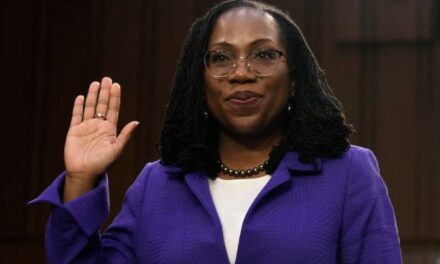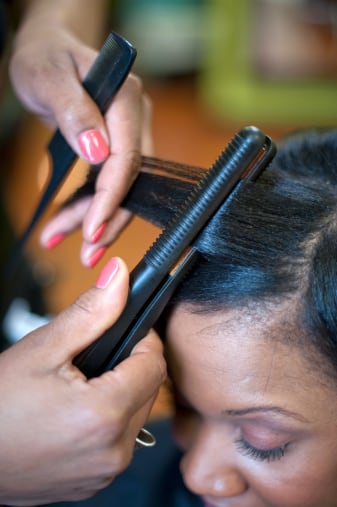Expectations of voter suppression and intimidation are at an all-time high in the days leading up to the 2020 presidential election, especially among Black Americans. Trump’s campaign rhetoric and strategic emphasis on ramping up voter fears by urging his supporters to “go into the polls” and “watch very closely,” continues to undermine the voting process and spread fears about the effectiveness of mail-in voting, which has become much more common due to COVID-19.
The toxic rhetoric and efforts to purge voter rolls in some states only add to the voting challenges African Americans face. Around the country, residents of election districts that are primarily made up of Black voters have become places where it’s an ongoing struggle to stay on the voter rolls or have your mail-in ballot counted. The fight to safeguard the Black vote this election season is critical.
“We know that voter suppression, since the inception of the country, has been about suppressing the math. It’s about making sure that if you couldn’t convert people to your way of thinking, you just kept them out of the process altogether,” said Stacey Abrams, an attorney and voting rights activist, speaking at Howard University’s King Lecture series in early October.

Donna Brazile, Stacey Abrams and Spencer Overton talk about challenges to voters in the 2020 election.
Abrams was joined by Spencer Overton, president of the Joint Center for Political and Economic Studies, for the event which was moderated by political strategist and two-time chair of the Democratic National Committee Donna Brazile. The discussion focused on efforts to prevent eligible citizens from participating in the local process, detecting these efforts, and good voting practices.
An important part of tackling voter suppression involves addressing certain falsehoods about the voting process, such as the idea that mail-in voting leads to massive voter fraud. While Trump has suggested this time and again, research has shown that this is not the case. This is what Overton explained.
Black Americans Targeted
“One study of vote by mail ballots in Colorado, Oregon and Washington found just 372 possible cases out of 14.6 million votes cast or 1 out of 39,000. A person is 13 times more likely to be struck by lightning at some point in his life than to commit voter fraud by mail,” he said.
There is also a racial dimension to the evaluation of mail-in ballots that cannot be ignored: Black voters in states that have been studied are 66% to 170% more likely to have their absentee ballots rejected. Abrams pointed out that part of this higher rate could be due to something as simple as your name.
“If you have someone who is not used to seeing punctuation in names or just finds your name to be surprising, they may flag you and say this isn’t a valid ballot,” she said.
In recent years, many attempts at voter suppression have also occurred on the internet via social media sites like Facebook, specifically targeting African-Americans. Take, for example, the Russian operated Williams and Kalvin Facebook page which posted an ad on Election Day 2016 with the message, ‘We don’t have any other choice this time but to boycott the election. This time we choose between two racists. No one represents Black people. Don’t go to vote.’
Citing statistics from the 2016 election, Overton noted that 98% of Russian content was related to the Black Lives Matter Movement and police brutality.
“Even though black folks are 13% of the population, Russia dedicated 38% of its ad buys to African Americans. What they did is they targeted Facebook ads at those people, that would discourage them from participating,” he said.
In 2016, there was the most significant decline of Black voter turnout in history, as compared to 2012. Considering recent moves by the Trump administration to prevent platforms like Twitter from taking down misinformation, as well as a new DOJ policy that would allow prosecutors who suspect election-related offenses to investigate, conduct searches, and make arrests, turnout could be suppressed this year as well. Should that contribute to a Trump victory, Abrams sees many risks for the most vulnerable and Americans in general.
“They [the Trump administration] will actually be able to roll back from where we were. That means that not only will we lose the Affordable Care Act, we will lose many of the freedoms and protections we’ve grown to expect and depend on,” she said.
Abrams added that lack of trust in our institutions may also lead to low participation in the 2020 U. S. Census. The census undercounts communities of color and this could continue if self-response rates don’t increase.
“The legislative redistricting based on the 2020 census governs Congress, the state legislature, but also the school board that will decide if your children learn in a COVID-ready classroom, if you have access to healthcare or whether criminal justice becomes a bygone question mark,” she said.
Overton cites the need to address voter risks linked to COVID-19. “We need to reduce wait times with vote by mail, early voting, and enough clean and secure polling places,” he said.
Know Your Rights
Both Overton and Abrams stressed the importance of voter education and awareness, especially given the new COVID-19 environment. Because of U. S. Postal service delays and funding issues, Abrams believes that it’s also important for people be proactive about tracking their votes.
“There are currently 34 states that let you track your ballot until it is accepted, and you need to find out if you live in a state that has to notify you if there’s a problem. What I would do is, as you get closer to the election, until your ballot has been accepted, you should call regularly,” she said.
On the topic of voter education, they recommended websites like vote.org and 866ourvote.org, which are trusted sources of information on registration, polling places and the census. They also urged voters to report disinformation whenever possible.
“The most important thing is, don’t let them dissuade you,” said Abrams. “The earlier you vote, the harder it is for certain challenges to work.”
Greer Jackson is a freelance writer based in Washington, D.C.








